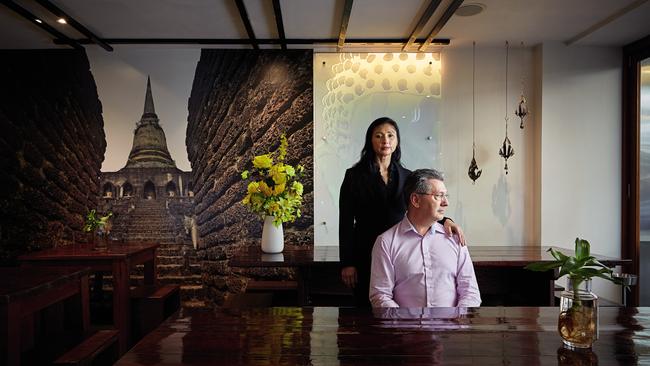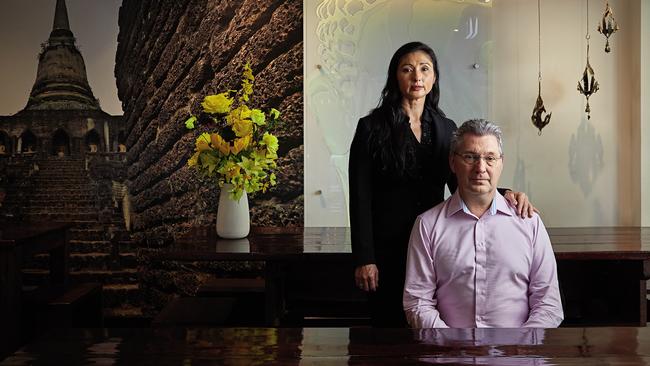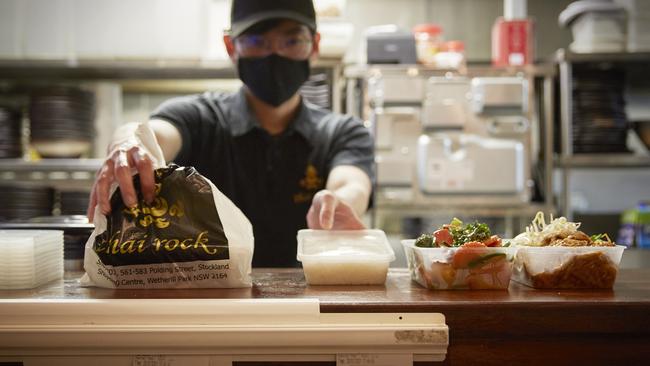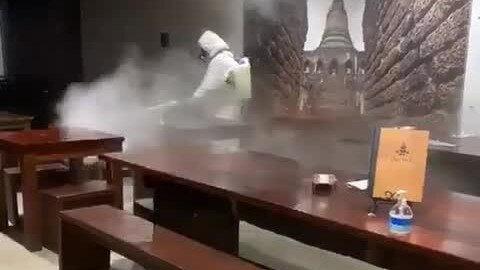‘All hell broke loose’: owners tell of toxic fallout from Sydney’s Thai Rock restaurant Covid cluster
The financial aftermath was bad enough after their restaurant business was linked to a Covid cluster. But nothing could prepare David and Stephanie Boyd for what came next.

David Boyd assumed he could fix most things. A determined optimist with a knack for finding parking spots, he’s a garrulous, assertive man and for a good chunk of his career he’s helped to disentangle other people’s work dilemmas. Problem-solving even led him to his wife Stephanie in 2012, when he was asked to reconfigure her small restaurant in Sydney’s western suburbs. But when a pandemic enveloped the globe and people everywhere found themselves living newly restricted lives, a disquieting realisation dawned on him. “I felt totally hopeless,” says Boyd, in an uncharacteristically dispirited moment. “It just didn’t seem credible what happened to us.”
For a few agonising months last year, he and his wife were at the centre of one of the country’s largest Covid outbreaks. But while the medical and financial consequences were serious, it was the social storm that encircled them – the torrents of online abuse, the racial slurs, the unfounded rumours – that caused the deepest harm.
Having a Covid cluster named after their family restaurants earned them an unenviable status, and the effects would be catastrophic and deeply personal. For the hitherto eternally optimistic David Boyd, there has been an additional sobering lesson: no matter how positive you might be, not every problem can be rectified.
Who would open a restaurant? With long hours, tight margins and lots of competition, it seems like a recipe for hardship. For Stephanie Boyd, though, it’s an alluring mix. “I love meeting people and I love cooking,” she says. She speaks openly and affably, but with an undertone of gravity; after a tumultuous year this is the first time she has been able to look back on it without crying. “It was such a dark time,” she says quietly. “It felt like a wall was coming down on us.”
This was not the mood Stephanie imagined when she joined the hospitality world 15 years ago. Having arrived from Cambodia as a child, she has spent the bulk of her life in Sydney, completing her schooling, starting a family, and later running a mortgage broking firm until the global financial crisis forced its closure. In 2006, she and her then partner opened a cafe in a mall in Wetherill Park, western Sydney. With three young children, and working 16-hour days, she eventually decided to diversify, opening a steakhouse in the same space.
A mutual friend introduced her to businessman David Boyd, hoping he might use his skills to improve the restaurant’s prospects. Smitten with Stephanie, then single again, and her cooking, he helped relaunch the restaurant eight years ago as Thai Rock, an east-west fusion. Later, the new couple decided to expand. “One restaurant wasn’t going to cut it for both of us,” says Stephanie. They chose a site on Bayswater Road, Potts Point, near the heart of Kings Cross, where a plethora of nearby apartments offered a good pool of potential customers.
“When we say we put in blood, sweat and tears, we mean all of it… We were really invested,” says David, who started working front of house in the new venue in December 2018, while Stephanie remained largely at their original location, supervising the menu for both sites. David loved mingling with customers and recommending wine and food combinations. “It’s the joy of giving people something that they have never had.”
By January 2020, when a new coronavirus had started seeping beyond the borders of China, he had returned to corporate life, though he remained co-owner. “Business wasn’t thriving as we expected,” says Stephanie. By the time the nation was locked down in March last year, she was overseeing the two restaurants from Wetherill Park while her son, Dylan Oaten, stepped in to manage Potts Point.
As it did for so many businesses, the national shutdown had an immediate and pronounced impact. Many of their overseas workers returned home and income fell by about 95 per cent. “We were so lost and scared because obviously there was no [government] package in the first few weeks,” says Stephanie. “Everything was up in the air.”
Slowly things picked up, though, and by the middle of last year, lockdown over, there were glimmers of hope and the joy of serving diners again. “We were not getting used to it, but we could see that each day there were more and more people ordering,” Stephanie says. “And when the lockdown was lifted there were a few more coming through. We were almost having the same sort of numbers that we had pre-Covid – until July 16. That’s when all hell broke loose.”

On that Thursday morning last winter, the Boyds received a call that recharted their lives: an employee from Wetherill Park, who had been working in the restaurant over multiple days without symptoms, told them she had just tested positive to Covid. “I was in shock and numb. I didn’t know what to do,” Stephanie says, still unsettled at the memory of that conversation and its enormous consequences. As an employer in a new and rapidly changing environment, she had no blueprint for what should happen next.
She called management at Stockland, the mall where the restaurant was located, but “they were not much of a help”. She called the Restaurant and Catering Industry Association for advice on leave entitlements and her position as an employer. And, with David, she decided to drive to the nearby Fairfield Hospital where, with a growing contingent of employees they had contacted, they lined up to be tested.
By 4.30pm they had both been swabbed and were driving off when Stephanie received another call. NSW Health informed her that a Wetherill Park staff member had tested positive to Covid-19. “I said, ‘I know that. We’ve just got ourselves tested,’” Stephanie recalls of the first of multiple communications, many of which were confusing. “And she [the caller] said, ‘Why? There was no need to. We didn’t ask you to go.’”
With many staff still being tested, David, who was in the car listening to the call, told the health worker that the remaining employees at Wetherill Park were asking patrons to leave so they could shut. “And they said, ‘Why have you done that? …That could create panic. No one from this department has asked you to close your restaurant.’”
“At no stage did NSW Health say, ‘You have to close,’” Stephanie says. “They didn’t give us that direct instruction. We just thought, “OK, we have to shut down, and we had to put everything in the fridge and just shut the door’.”
The Boyds drove home upset and confused, concerned about their business and worried about the employee who had tested positive. Over the following hours, as they answered calls from friends and relatives, they were unaware that they were only at the precipice of a prolonged period of turmoil. By daylight on July 17, Thai Rock, the suburban restaurant that had been relaunched in the hope of attracting more attention, was heading into the nation’s Covid lexicon.
That Friday, NSW Health released its daily update. Among the eight new cases was the Boyds’ employee, identified as a woman in her 30s who had worked at Thai Rock in Wetherill Park on multiple days between July 9 and 14. Later that day NSW Health issued another release – a public health alert specifically about Thai Rock. Anyone who had attended the restaurant on any of those days should be tested immediately and isolate for 14 days. A previously identified case, it turned out, had also dined there on one of those dates, July 10, as had a third case, it now emerged.
At home isolating, Stephanie could see the first signs that her lovingly tended business might dissolve. “Watching the news was surreal, having our name up there and the photos splashed everywhere. It was quite an out-of-body experience.” That night, a specialist cleaning crew arrived at the empty restaurant. Dressed in hazmat suits, they treated every surface: tables, chairs, bars, bottles, the kitchen. The bill for $4500 was the first of many that would be added to the Boyds’ growing pandemic-related tab. But the financial burden was not the only cost they would carry.
If you harvest your news from certain slivers of social media, you’re likely to end up with an ugly view of Stephanie and David Boyd, who became alarmed during their fortnight of isolation about a litany of allegations being made about them. That Friday, July 17, they had announced online that the restaurant was closing because of a positive case, and while there were some notably supportive responses, many were not. On Facebook, they were accused of not being Covid-safe. On Twitter their business was referred to as “a festering pile”. “If you want your grandmother to pass away, this is the perfect place,” alleged one review on Google.
As the number of cases associated with the restaurant grew – 16 within three days, dozens within a week – and other states began to shut out parts of NSW as a result, so did the rumours and allegations thrown at the Boyds, whispers that soon became louder and nastier: they had lied to NSW Health, their establishment was a vector for Covid, they had questionable hygiene practices, they had sabotaged the economy’s recovery, they had intentionally spread the virus and had caused the neighbourhood to be closed to Queensland, among a litany of unsubstantiated allegations.
“Does it occur to you that there are some 70 cases of this grubby virus from your grubby Weatherill [sic] Park restaurant?” one Facebook user posted. “Don’t you try to hide behind the excuse that you are an ‘Asian’ business that has been singled out. You have been singled out because you have not acted in a proper manner and the fact that the police and Ray Hadley have an interest in your activities.”
As a top-rating morning radio host, Ray Hadley has a loud voice. A few days into the Boyds’ enforced isolation, Hadley spoke to his listeners about them and their western Sydney eatery. “I have allegations that that directive [to self-isolate] was not taken very seriously by the owners… which is almost breathtakingly stupid,” he declared. “…The husband of the owner who had been at the restaurant didn’t self-isolate as instructed and even continued to work at his job at a nearby hardware store and allegedly had contact with customers. Now that bloke should be in jail in my opinion.” Hadley later amended his claim and said the owner’s brother, not her husband, had worked at the restaurant and a hardware store without self-isolating. Hadley also referred to community calls being made to Crime Stoppers.
The net of accusations was widening rapidly and, for the Boyds, incomprehensibly. “To drag my family into it was worse than my business being affected by it,” says Stephanie. A TV crew appeared at her family’s hardware store, where several organisations also started refusing to deliver supplies. Eric Lim, one of Stephanie’s brothers who works at the family business, was visited by police and told that CCTV footage would be checked and that he should not leave home in the meantime. “I never worked in Stephanie’s Thai Rock and I had not eaten there for that month,” he says.
When the police left, he called his sister and brother-in-law, fearful of doing the wrong thing while publicity about his workplace was increasing. A confounded Lim ended up isolating for 14 days with his family. Without having set foot in the restaurant or being a designated close contact, he was suddenly thrust into the wide cast of victims of its Covid outbreak. “We were scared, to be honest,” he says now, “because of the rumours of people watching us.”
But that was not his only worry. Police visited the Boyds and asked about Lim. The couple insisted to the three officers that as Lim had not been at the restaurant for weeks, he had no reason to isolate. “They were standing at our front door,” says David, who admits to arguing with police, “and they said, ‘If he leaves we will arrest him.’”

As the Boyds sat at home for two weeks, visited by police several times to ensure they were isolating, their restaurant closed, their Covid story continued to evolve. Every day cases mounted. On July 21, 10 of the 13 people diagnosed in NSW were associated with Thai Rock Wetherill Park. By the next day, the tally was 37 cases. Soon the cluster included several children, and schools were being deep-cleaned. And then, on the other side of the city, NSW Health called again.
Dylan Oaten, Stephanie’s son who had taken over managing the Potts Point restaurant, was at his Sydney unit when he took the call. Another customer had tested positive – this time at Potts Point. He called his mother. “We went numb,” says Stephanie. “What the hell? Lightning wouldn’t strike twice. But it did.”
As no staff were showing symptoms, the health official said no one needed to be tested. But that advice was soon revoked. In an email to David Boyd on July 22, NSW Health confirmed that all staff should be tested. Within hours, his staff were panicked. “I would like to know why the messaging has now changed, especially as we had followed your guidelines… only to have it changed and causing alarm.” Eventually the restaurant’s entire workforce headed off to be swabbed. Later that day, David advised NSW Health that because all staff were self-isolating, the Potts Points restaurant had closed for an indeterminate time.
Dylan was back at his unit soon after when he received another call from NSW Health. Although he was experiencing no symptoms, he, too, had contracted Covid-19. “And then I was shitting myself,” he says. “Wetherill Park and now Potts Point. And obviously the only two connections [were] they’re the same restaurant. Everything went into meltdown about 20 minutes later.”
On July 26, NSW Health issued another public health update directing everyone who attended Thai Rock at Potts Point for two hours or more between July 15 and July 25 to immediately be tested for Covid-19 and self-isolate for 14 days since they were last there, regardless of symptoms.
Although no links had been identified between cases at the two sites, the month continued to bring bad news. As July ended, there were close to 100 cases of Covid associated with the Boyds’ two restaurants, and the Thai Rock clusters, as they became known, had extended across Sydney. In the end, 116 cases would be linked to Wetherill Park and 38 to Potts Point, taking in several workplaces, a sporting match and a church. The Boyds’ livelihood was now associated with one of the biggest outbreaks of the pandemic.

When they had finished isolating, and with both premises deep-cleaned, the Boyds could have reopened for business. But they faced so many issues – not enough staff, concern for the welfare of those who remained, hoping that Dylan, although asymptomatic, would be OK – that they waited until early September to try to resume their old lives.
By then Stephanie was mentally exhausted. She had endured several false alarms – she and David were each told, incorrectly, that they had tested positive, while NSW Health had also alerted Dylan that a supposed employee, of whom he had never heard, also had the virus. And the personal attacks kept coming. They were largely online – nothing was ever said directly to any family member – and overwhelmingly directed at Stephanie.
“I’ve been to Thailand and they are great little sex objects. So you married her? Shit mate you must be desperate,” was one of the comparatively few missives hurled at a distraught David, who was rendered helpless. As far as these accusers were concerned, he says, “it was all her fault – ‘Die and go the hell back to where you belong’; ‘Go back to your own place you prostitute’. It was non-stop.”
Dylan, a tech-savvy 23-year-old, was gobsmacked by the level of acrimony and closed some of his social media accounts. “It got to the point where people would think we cooked it [Covid] in our kitchen and served it to customers,” he says.
As the target of so much hatred, Stephanie became increasingly despondent and for a time sought daily counselling. “People were blaming us for creating the cluster. They were attacking me personally to say that I was responsible for it. The racism I felt since July last year I have never felt in the 40 years I have lived here,” she says, and pauses. “Going through the Killing Fields [of Cambodia] it was horrendous. We were starved. We were not allowed food... [but] I was more teary and more mentally devastated by what I went through for 10 weeks here than what I went through in the Killing Fields for four years.”
No one is certain how Covid-19 came into the Boyds’ lives. Genomic sequencing for cases from the two Thai Rock clusters showed that they were linked. But where the first case originated and how it spread to Potts Point has not been revealed. The Boyds believe they are victims of bad luck, that two separate customers must have brought the virus into the two venues. But Professor William Rawlinson, senior medical virologist at UNSW, says that the sequencing linkage suggests it is highly likely the clusters originated from the same source – a staff member or customer, for example – or were spread from one venue to the next. “When you find an identical match... the likelihood of that being there by chance is astronomically low,” he says.
The Boyds insist that neither they nor their workers or delivery drivers moved between the Wetherill Park and Potts Point venues last July at a time when any of them might have been infectious. “Most of my staff don’t have a car; there’s no need,” says Stephanie. “And to get [from Potts Point] to Wetherill Park they would have to get a train for about 50 minutes and then catch a bus for another 25 to 30 minutes.” Nor, she says, did she or David leave their home during isolation; with a photographer waiting outside for several days, “we were scared to even put the rubbish out”. NSW Police have confirmed that no offences were detected and that investigations are complete.
A year on, even with the vocal online support of many old customers, and with Wetherill Park returning to pre-Covid trade before this latest Sydney lockdown, the Boyds are still attempting to scrub away the residue of their Covid story, “trying to demonstrate that we are going above and beyond what we are required to do,” says Stephanie, for whom the fallout remains keenly personal. “Our family members don’t look at us in the same way anymore.” She and David have borrowed significantly to pay for so many unexpected costs: microbiologists, lawyers, thousands of dollars for different types of hand sanitisers, $3000 more for a surface sanitiser so that they can keep doing regular deep cleans themselves. They even briefly pondered changing their business’s name, but decided against it. “We did nothing wrong,” says David. “Changing the name [says] I’ve got something to hide.”
All up, the clusters and flow-on effects have cost them $500,000 in lost income and stock – and still, they’ve not quite managed to erase the recent past. “People still think we’re unhygienic. I don’t know what goes through their minds,” says Stephanie, who suffered heightened anxiety in the latest outbreak. “Mentally I am all over the place. But I was sort of glad to hear that we finally got locked down [again], only because I was so nervous while we were able to trade. Because any time somebody who is positive could walk in.”
And that’s the precarious reality that they and other proprietors are forced to endure. “This thing makes victims of everybody,” says David. “Even right now, with the multiple layers of protection that we have got, we are literally a heartbeat away from someone who’s got it walking into the restaurant – and it’s game over.”


To join the conversation, please log in. Don't have an account? Register
Join the conversation, you are commenting as Logout